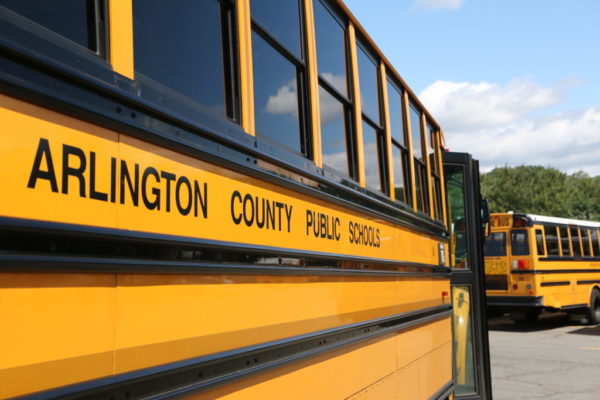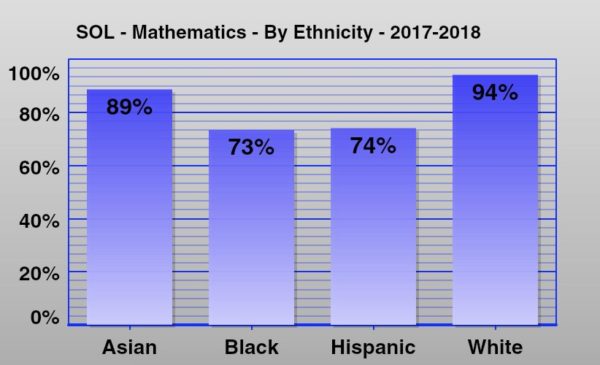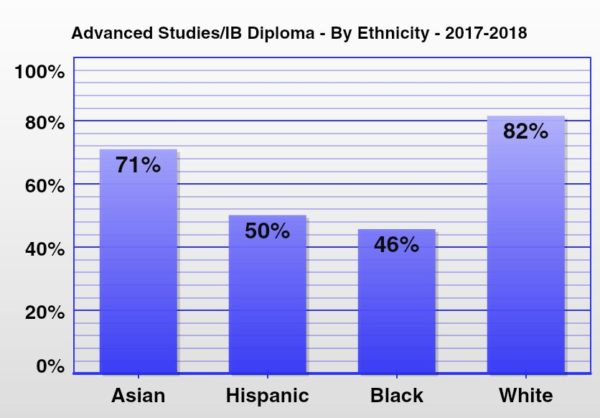(Updated at 4 p.m.) Several parents with children in Arlington Public Schools have formed a group to address what they say are persistent racial disparities in the county’s school system.
The group, Black Parents of Arlington, shared a pamphlet with public data on issues like discipline they say show how APS students of color are being left behind. Together, the members plan to advocate for solutions and support other parents of color in running for PTAs and APS advisory positions.
“Yes we are happy to know that the majority of black students are taking at least one AP or IB class,” said BPA member Amina Luqman-Dawson. “However, it is really sobering to see that the pass rates are at 31%.”
Another area where disparities exist: standardized testing. The latest results from state-mandated Standards of Learning tests show disparities between white, Asian and multiracial students on one side, and black and Latino students on the other side, the Sun Gazette reported Tuesday.
Members said they were proud of APS’s high on-time graduation rates, but pointed out that APS data indicates only about 46% of black students earned advanced studies diplomas over the last three years — compared to around 82% of white students.
“We’re not looking for just passing, we’re looking for excellence,” said Luqman-Dawson, who lives in Shirlington and works with education policy and non-profits.
Another data set highlighted in the group’s pamphlet is the rate at which white youth versus black youth are entered into APS’s Gifted and Talented Program: 12% percent of black students in 2017-2018 entered the program, compared to 25% of white students.
“We are not only looking at how black students are being negatively stereotyped,” said Luqman-Dawson. “I think you’re also looking at how white students are being favorably viewed.”
In response, Arlington Public Schools acknowledged the issue and said it is continuing to work to close what it described as an “opportunity gap.”
“We agree that there is a gap that exists between student groups,” APS spokesman Frank Bellavia said in a statement today (Wednesday). “We have a professional commitment to close the opportunity gap, and this is a top priority for APS and the School Board.”
Bellavia said APS needed to make more improvements, but highlighted some the school system had made, including:
- Increasing the graduation rate of black students
- Increasing the pass rates of mathematics standardized tests for black students
- Hiring a Diversity Officer with the fiscal year 2020 budget
- The APS Mathematics Office holding four parent-teacher sessions for black families
The school system has previously faced scrutiny for its discipline rates, racist reactions to a diversity sign in Yorktown High School, and more recently, for backlash after a teacher unknowingly-planted cotton. In May, APS also signed a Department of Justice settlement over inadequate support for English-language-learning students and their families.
BPA member Sherrice Kerns, who lives in Penrose and works as a policy analyst, pointed out in a Tuesday interview that these findings mirrors national data about racial disparities in schools.
“APS is certainly not immune to these sorts of disparities,” she said.
“This is not unique to Arlington,” agreed Bellavia in his statement. “School systems across the country have been addressing this challenge for a long time.”
Today, BPA’s members say they hope to work together on several problems, including:
- Closing the achievement gap between black and white students
- Making staff cultural competency training mandatory
- Updating discipline policies to ensure black students are not excessively punished nor unfairly prosecuted
Members of the group all told ARLnow that they hope BPA can help advocate for other parents of color who don’t have time for nighttime meeting and advocacy. They also are seeking to boost membership in PTAs among black parents. The group is planning a cookout for parents interested in joining BPA on Sunday, September 8 at Alcova Heights Park (901 S. George Mason Drive) from 3-5 p.m.
“One of the our goals is to bridge the gap between the parents who aren’t able to show up to meetings,” said Luqman-Dawson.
The members said overall they support APS, with several mentioning they moved to Arlington because APS was highly ranked and offered quality programs. But since then, Luqman-Dawson said it’s been “sobering” to see racial bias even at the schools as good as the ones in APS.
“It’s hard to send a child to school thinking that they are going to be victims, or going to be poorly judged,” she said.
BPA member Zakiya Worthey, who lives in Penrose and works as a mental health therapist, told ARLnow that the group has existed informally for several years, as several black parents would meet at Adora Williams home to discuss problems their own children experienced. But it’s now becoming more active, as resolve has grown to tackle issues at APS that members of the group have long seen as systemic.
“One the issues is being black in America is that you always know you’re black in America,” said member Whytni Kernodle, who works as an attorney and lives in Courthouse.
Data from earlier this year indicated that racial disparities may exist for Arlington youth outside of school as well: a report found that hispanic youth were four times as likely to be obese as their white peers, and that the total number of kids who said they received the necessary help for their depression “was so low for Black and Asian youth that a percentage could not be reported.”
The full response from APS regarding the racial disparities is below.
We agree that there is a gap that exists between student groups. Eliminating that gap to ensure growth and success for all students is our primary mission as a school division. This is not unique to Arlington. School systems across the country have been addressing this challenge for a long time. We have a professional commitment to close the opportunity gap, and this is a top priority for APS and the School Board. We are putting the strategies, systems and additional resources in place to meet the individual needs of all our students and to address those gaps.
A lot of progress has been made, and we can always do more. As a school division, we are focused on ensuring continuous improvement in all subject areas and for all student groups. Over the last five years, the graduation rate of black students has shown an upward trend, and our most recent SOL pass rates show that black students are exceeding the pass rates of their peers across the state. The pass rate for APS’ black students in Mathematics increased from 71% to 77% from 2017-18 to 2018-19. This pass rate exceeds the Virginia pass rate by 7 points and demonstrates greater one-year growth than any other gap group. APS teachers, coaches, and administrators were engaged in high-quality professional learning to address the needs of diverse learners by focusing on strategies and instructional structures. In addition to APS staff professional learning, the Math Office also facilitated four parent outreach sessions for Black families that focused on advocacy and supporting their learners at home.
Putting additional measures, practices and student supports in place to further increase achievement for black students and all reporting groups is a central focus of our 2018-24 Strategic Plan. Student success and student well-being are two of the goals in our new 2018-24 Strategic Plan that address the opportunity gap directly. In working to meet that goal, the APS Office of Equity and Excellence (OEE) is taking the lead in looking at the data and identifying areas that we can make additional improvements as well as collaborating with schools and departments. OEE also regularly hosts the Black Parent Alliance throughout the school years to provide families supports and resources to support black student achievement. The School Board approved the hiring of a Diversity Officer in the FY20 budget to further advance and elevate our work in furthering the elimination of the opportunity gap division-wide.
Keeping students in school is paramount to our efforts in this area. As part of the strategic plan, we are also focused on eliminating disproportionality in suspensions by putting additional supports for students in place. We are also offering more training and professional learning in restorative practices, increasing funding for schools to develop proactive measures and alternatives to suspensions, and providing our staff with additional social-emotional learning resources and tools to address student behavior in lieu of suspension. Staff is also receiving deep equity training to ensure they are able to create equitable learning environments for all students, especially black students.
Throughout the 2019-20 school year, APS will continue to focus on Equity and Inclusion and is in the process of developing equity and inclusion policies to standardize equitable and inclusive practices across the school division. Staff will continue to evaluate the way our practices impact student success and well-being, advance equity, and improve student outcomes for all learners in APS. Our commitment is that every student succeeds. School-based and central office staff are working to ensure that supports are in place to meet the unique needs of all students. We look forward to working with all of our families to achieve this goal.




